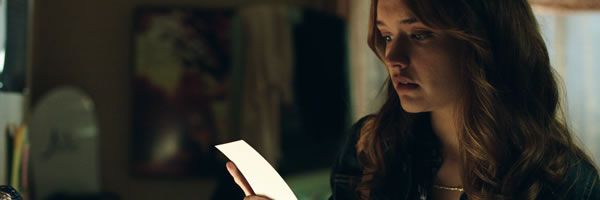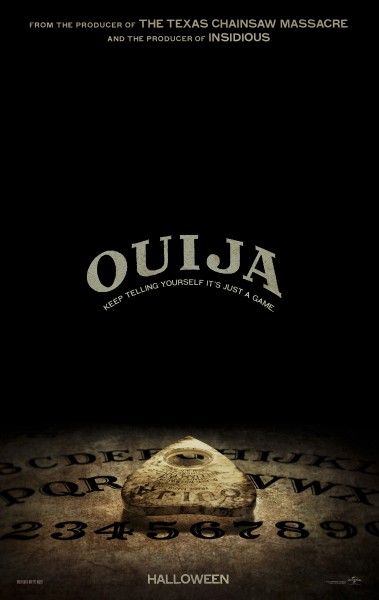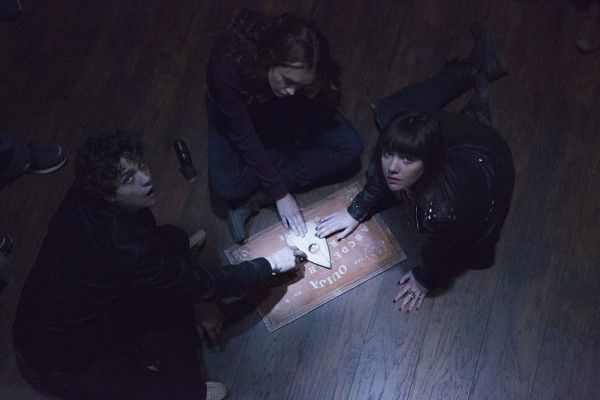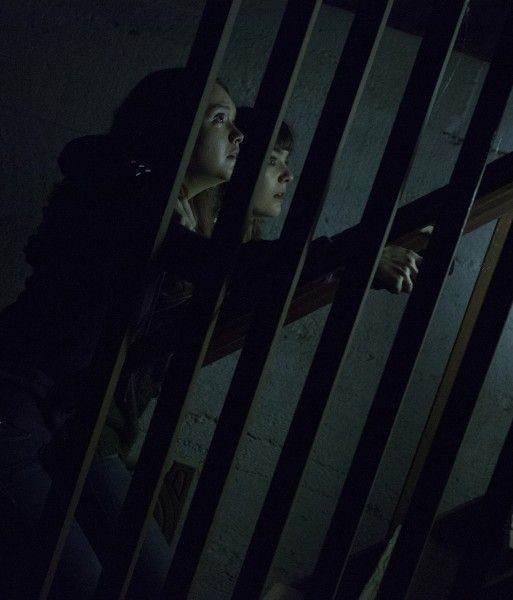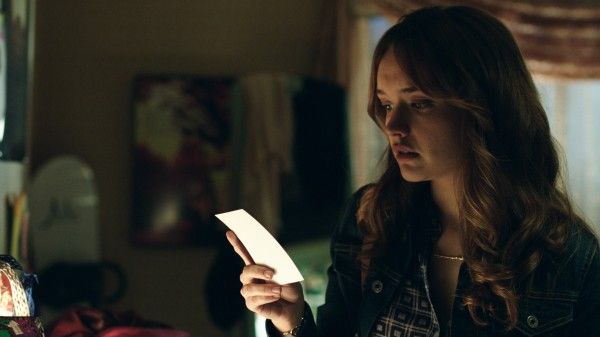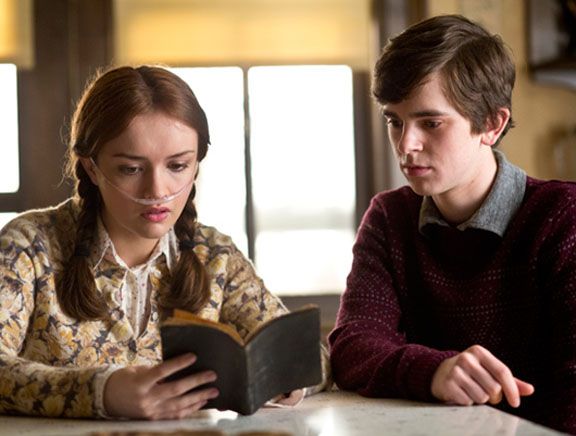Ouija is a supernatural thriller about a group of friends who must confront their most terrifying fears, as they attempt to make contact with the other side and unleash an evil that that they may never be able to stop. When Laine’s (Olivia Cooke) childhood best friend Debbie (Shelley Hennig) suddenly dies, she discovers an antique Ouija board that she thinks can be used to say goodbye to her friend, but instead it quickly turns into a dangerous game where they might all meet the same fate as their friend.
At the film’s press day, appropriately held at the Hollywood Forever Cemetery, actress Olivia Cooke spoke to Collider for this exclusive interview about why she wanted to be a part of this project, how she related to her character, just how much the story changed and evolved, re-shooting 50% of the film, who she’d want to contact with a Ouija board, the most challenging aspect of the shoot, having so much fun with this cast, and why she doesn’t think she’d return for a sequel. She also talked about shooting Me & Earl & the Dying Girl for director Alfonso Gomez-Rejon, the experience of shaving her head for the role and how close they’re sticking to the book that it’s adapted from, as well as what fans can expect from Season 3 of her A&E TV series Bates Motel. Hit the jump for the interview.
How did this come about? Did you audition for this role?
OLIVIA COOKE: I only had one audition, and then they offered me the part. They probably offered it to 10 other people before me. It was a no-brainer to play such a strong female, which she is. That definitely speaks to me. I like to play as strong a character as possible, so it really spoke to me. And I thought the story was really good. Also, apart from one Paranormal Activity where there was a mention of a Ouija board and the Ouija board was there, I’ve never really seen a whole feature dedicated to a Ouija board, which seems ridiculous. It just seemed like something so accessible and universal that I had to be a part of it.
Did you find yourself easily relating to this character?
COOKE: Definitely! She’s a little more serious and she’s got a lot more to deal with than I do, but I’ve got a 15-year-old sister, as well, so I definitely feel that sisterly tough love, and that maternal and protective instinct. So, I used that a lot more than I usually do, in my real life. I let that really show. Laine is quite serious, but it’s a life-and-death situation, so there’s a cause for her seriousness.
Was it challenging to establish the bond between Laine and Debbie, with just one scene of them when they were younger and one other scene when they’re older?
COOKE: No. In those situations, you’ve really just gotta draw on past experience and past situations with best friends. And Shelley [Hennig] is so lovely and so easy to get along with, and a really, really great girl. She made it very easy for me to relate to her, as my best friend. Sometimes it can come across as quite wooden, and that’s what we definitely didn’t want.
How much did this change and evolve, from when you first read it to what we see now?
COOKE: Oh, it changed so much. There were like five drafts of the script that I read. And then, we finished the movie in January, and Universal wanted to make a few more changes, so we came back in May and shot 50% of the movie again. It changed a lot for the better, for sure. It was so good that we were able to do that because it meant that Universal believed in the movie so much, which is a relief. It could have just gone into an archive, or something. So, it changed a lot. The finished arc is definitely the strongest arc that I’ve seen, out of everything that I read, even from the earliest draft that I read.
What were the biggest changes?
COOKE: You think it’s over 3/4 of the way through, but it really was over. They added that bit on the end, where she has to go back to the house and do more ritual. The whole basement and shrine was added. The mother wasn’t involved. A lot of things changed with the main plots of the story.
Had you ever seen or played with a Ouija board before this?
COOKE: I think I saw someone play with a homemade Ouija board, with the letters typed out in a circle and a bottle that you spun. With my friends, I was always like, “Let’s go to an abandoned barn and play with a Ouija board and see what happens.” I’ve heard horror stories about things flying, and poltergeist erupting from the board and smacking everyone in the face, so I was like, “Yeah, let’s do it!” They were like, “No, Olivia! Let’s watch 13 Going on 30.” Ana [Coto] is from Puerto Rico, and her family really didn’t want her to take the film because they’ve heard the mythology behind it.
If you could use a Ouija board, knowing that there would be no ramifications, who would you want to talk to?
COOKE: Maybe a relative that I’ve never met before, like my mom’s dad, who died when she was seven. That would be nice. She doesn’t really remember a lot about him, and I could get some information about what he was like. Or just really early ancestors that I don’t know anything about, to learn about where we came from. That would be cool. I’d want to do something close to home and not somebody famous.
When you do something like this, with so many intense and scary moments, which was the most challenging to shoot?
COOKE: The stuff with us all being at the table with the Ouija board. That took days at a time because there was a person underneath controlling it. We didn’t control it with our hands. They’d have a mirror image of the Ouija board, and they would see it and move it, but sometimes the magnets wouldn’t work. There were a lot of things involved, so that took a lot of time. They had to get it back up and running, and keeping the pace, the atmosphere and the fear was quite difficult, but I think we got it, in the end. I hope we did.
You hear about weird things happening on the set of scary movies. Did anything weird of creepy happen on this film?
COOKE: There was a time when I’m in the attic, when I see DZ for the first time and she crawls toward me, and that was really scary. That was the first time I’d seen her in the dark. I was crawling backwards and she was racing towards me, and I had to be pulled from in between the beams by one of the cameraman. I was so fearful that I couldn’t get back in time. That was scary.
How was this cast to work with? Did you guys have a lot of fun together?
COOKE: I think we had a bit too much fun and it was a bit too light, at times. Maybe people got a bit pissed off with us because we were so jovial when we’d come off set and be messing around, especially me and Daren [Kagasoff]. But, it was great how quickly we focused and put our heads in the game. Everyone is working so hard, when you’re on set, there isn’t really any time to mess about. The house would be completely blacked out, and it’s 11 am and you go outside and go, “Oh, my god, it’s a glorious day,” but you’ve been in nighttime for five days.
This story is definitely left open-ended. If it does well, would you like to revisit this character and continue with this story?
COOKE: I don’t know. Never say never. But, I think I’m done with horror for while. I’ve done my fair amount, so I think I need to do a comedy. I’m depressed.
You also did Me & Earl & the Dying Girl, right?
COOKE: Yes, which is a comedy, believe it or not. My character is one of the more tragic characters in the story, obviously, because I play the dying girl, but it is a really, really funny story, and it’s made funny by the characters. We’ve got Molly Shannon, Nick Offerman, Connie Britton, Jon Bernthal.
How was the experience of shaving your head? Did it feel freeing, or were there some tears involved?
COOKE: I thought it would be freeing and I thought it would be really liberating, but I never realized how much I love my hair. We cut my hair off, and we were filming it, so Thomas Mann and RJ [Cyler] were there, and the camera man and Alfonso [Gomez-Rejon], the director, were there. They all had little cameras and were doing it on their iPhones. We cut it off, and we were in character and we were laughing. I looked like Anne Hathaway in Les Mis, when it gets shorn and she’s crying, but I wasn’t crying, I was laughing. And then, we got the razor and shaved a mohawk in, and I was like, “Haha, I’ve gone Mohican!” And then, I started to shave the front off and Thomas cleaned up the back, and I was just rubbing my head. The whole point is that I’m trying to take control of the cancer and trying to gulp back the tears. I let out this little weird scream because I’d clogged it up so much, and then the tears just flowed. It was so unexpected because I had just been laughing, two minutes before. It was just electric. It was really strange. It was the most amazing experience, but I don’t want to repeat it.
How was it to work with Alfonso Gomez-Rejon?
COOKE: He’s amazing. He’s absolutely incredible. He’s a genius. I can’t say anything bad about him. He’s just incredible to work with, and so trusting with me and everyone else. He has the greatest direction without realizing that you’re being directed or pulled in a certain way. He’s just incredible. I think he’s gonna be one of the greatest directors, ever. And the thing about our crew was that everyone knew he would make it as good as it could possibly be. Everyone worked together, and the crew was absolutely amazing. They were just the best crew. It was the best experience I’ve ever had. I’ve not seen the film yet, but everyone keeps emailing me to tell me that it’s really incredible. I’m so pessimistic. Now that I’ve built it up in my head that it’s gonna be amazing, I’ll see it and it will be really bad. It won’t be. It will be really good.
Is it staying pretty close to the book that it’s adapted from?
COOKE: Yeah. My character is more development in the script than in the book. In the book, it’s more about Me & Earl. In the movie, my relationship with Greg, who’s played by Thomas Mann is the heart of the story. The writer of the book wrote the script, so whatever he wanted to change and whatever he wanted to enhance, he could. There couldn’t be anyone better for the story than the writer of the book. It was so lucky.
What can you say to tease Season 3 of Bates Motel?
COOKE: This season, we’re keeping it very much in the family. Everything is very, very close, and everyone is very close knit. Everyone is just a lot closer. The motel is back to basics. I think that’s all I can give away. I’ve read the first two episodes and they’re amazing.
Does it feel like you’re playing a more mature version of Emma now?
COOKE: Oh, without a doubt. I started playing Emma when I was 18, and it was one of my first jobs. I moved from England, and I’d never really been out of Europe, so I’ve grown with her. I’ve grown up and I’m 20 now, and she’s had a lot more experiences. This season, her health deteriorates a bit more, as well. With that, she becomes more aware of her mortality. But Emma is light, for the most part. She’s the most positive character that I’ve ever played. I’m just not like that. I’m very English and very real and very realistic and pessimistic, almost all the time.
Ouija opens in theaters on October 24th.

